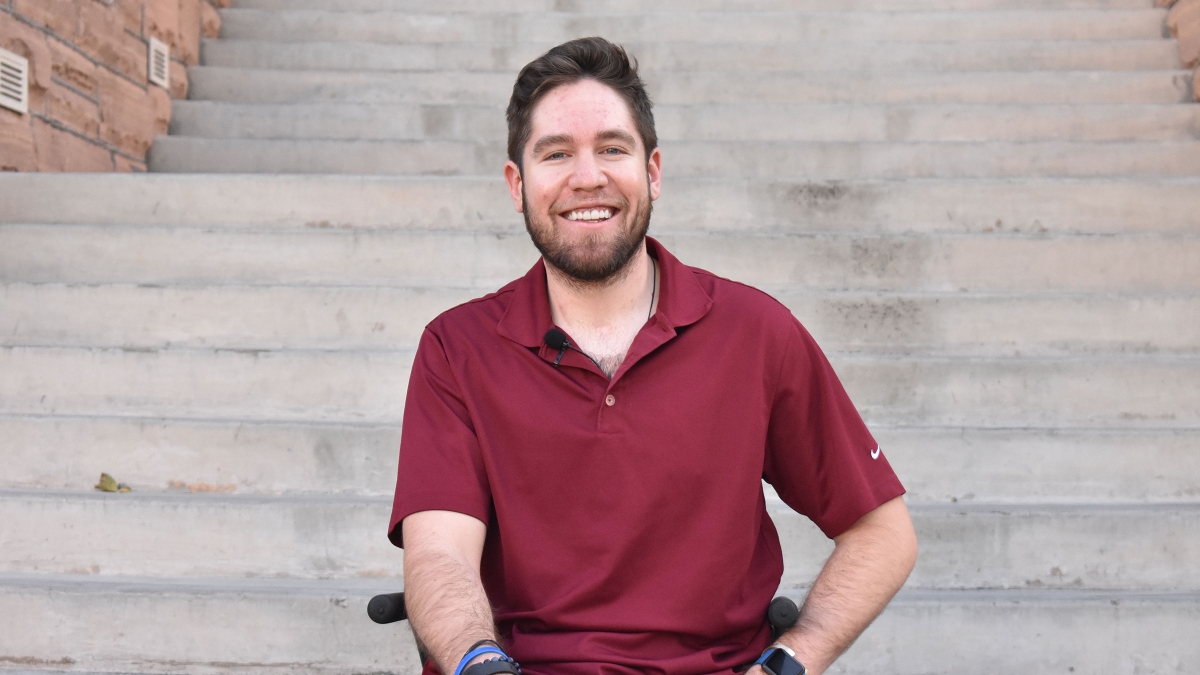ASU graduate aims to use his difficult journey to inspire others

At the end of Christian Kainoa Spenser's sophomore year at Seton Hall University, he began feeling ill. After returning home, he was put in a medically induced coma for three weeks and awoke to find necrotizing fasciitis had claimed his legs and soon parts of his hands. He began the process of healing — a journey that would take him to an internship in the governor’s office and a degree in civic and economic thought and leadership from ASU. Photo by Joe Martin/ASU
Editor's note: This story is part of a series of profiles of notable spring 2021 graduates.
Christian Kainoa Spenser is set to graduate from Arizona State University on May 3. When he receives his diploma, it will be the end of a four-year journey with nearly insurmountable obstacles in his way.
“My education journey has been defined by adapting to different and hard situations,” he said.
In May 2017, Spenser was finishing his sophomore year at Seton Hall University in New Jersey when he started to feel ill. He passed out during a final but was able to get home to Scottsdale, Arizona. He was quickly taken to a nearby hospital where he was in a medically induced coma for over three weeks.
“The last thing I really remember was being in the intake room doing the vitals with my grandma and looking down at her hand,” said Spenser.
When he woke up, the doctors told him that he didn’t have his legs anymore and that they needed to amputate his hands. Spenser was diagnosed with a rare disorder called necrotizing fasciitis, commonly referred to as “flesh-eating bacteria.” After three months Spenser was released from the hospital.
“Ever since then, it’s been a continual journey of healing and growing in lots of different ways,” said Spenser.
The summer before Spenser got sick, he’d applied for an internship with Arizona Gov. Doug Ducey. When Ducey heard of his story, he visited Spenser in the hospital with an acceptance letter to the internship.
When Spenser was ready and dedicated to restarting his education, he worked as an intern in the governor’s office. Whether it was meeting with Rep. Jennifer Longdon to talk about planning a more accessible city for people with disabilities or helping legislative policy advisers, he had the opportunity to experience firsthand what it takes to run a state government.
When Ducey learned that Spenser wanted to continue to pursue his education, he recommended the School of Civic and Economic Thought and Leadership (SCETL), which at the time was new to ASU. Intrigued by civil governance, innovation, philosophy and learning what it takes to be an entrepreneur, Spenser thought the new academic program was a natural fit.
“It fell right along my alley of wanting to be able to help people, give back to the community and learn how we can do that at an institutional level,” said Spenser, who is graduating with a major in civic and economic thought and leadership.
“Education has always been this thing for me — no matter where you come from, no matter who you are, no matter the ability people say you have, it’s something all people can have to really move up and grow,” said Spenser.
The governor created a video address for SCETL's Class of 2021 in which he gave a special shoutout to Spenser: “Kainoa has faced considerable challenges to get here, but he has persevered every step of the way. I’m proud of Kainoa and our other SCETL graduates.”
Spenser works with the K2 Adventures Foundation, which raises money for people living with limb loss and limb difference. Before the pandemic, he frequently traveled around the state sharing his story and the lessons he has learned. Those experiences, combined with his education, have made Spenser passionate about using his education to help others.
“Academia and education have always played a big role in my life … it’s not getting the degree but going through the process of graduating and what you learn through that is the best part,” he said.
After graduation, Spenser plans to continue to speak about his story and start a nonprofit organization to aid those living with seen and unseen disabilities. He is also interested in pursuing graduate studies and traveling to Japan to climb Mt. Kilimanjaro.
Question: If someone gave you $40 million to solve one problem on our planet, what would you tackle?
Answer: First, I would do tangible things, like making Tempe and Scottsdale accessible. … So that whether you are a student, a worker, or someone who wants to get out and exercise around town can do so with dignity and ease.
Q: What was your “aha” moment, when you realized you wanted to study the field you majored in?
A: It was looking at the website and seeing the pursuit of discussion-oriented courses that drew me in. Hearing lectures from professors is incredible, but getting the student-on-student discussion is really what drives people to learn and really taking on the lessons that the authors have to teach us.
Q: What’s something you learned while at ASU — in the classroom or otherwise — that surprised you or changed your perspective?
A: I’ve gotten this lesson a lot in my life — you’re always a student and can never know what someone is going to say … you can find knowledge anywhere. I came from a smaller campus so when I found myself sitting in the middle of a ginormous campus and random people come up to you and have great conversations, you think “Wow, this is the cool experience of a bigger university.” It was the little lessons that the university taught me through the people.
Q: Which professor taught you the most important lesson while at ASU?
A: Dr. Peter McNamara was one of my first professors. I really liked his teaching style, the books we read and the discussions we had in his course.
More Law, journalism and politics

Annual John P. Frank Memorial Lecture enters its 26th year
Dahlia Lithwick, an MSNBC analyst and senior legal correspondent at Slate, is the featured speaker at the School of…

The politics behind picking a romantic partner
A new study reveals the role that politics play when picking out a romantic partner — particularly for older adults.“Findings…

Tips to make tax season less taxing
When it comes to highly unpleasant experiences, filing taxes is probably up there with root canals — which is why people put off…

